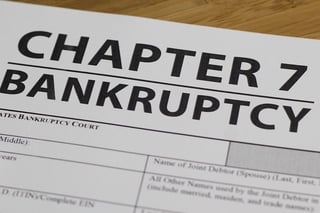 1. What is Chapter 7 Bankruptcy?
1. What is Chapter 7 Bankruptcy?
Chapter 7 Bankruptcy is also known as the “fresh start” bankruptcy. Chapter 7 Bankruptcy provides debtors (an individual who files bankruptcy) with the opportunity to escape liability on certain types of secured and unsecured debts. Upon successfully receiving a discharge, debtors are no longer liable for money owed on most debts.
2. Who qualifies for Chapter 7 Bankruptcy?
We are often asked, “Do I have enough debt for bankruptcy”. Although an important question, the amount of debt is not a requirement of filing bankruptcy. Ultimately, if you have overwhelming debt, but no means to satisfy the debt, bankruptcy may be a great option. Bankruptcy is designed to provide relief to people in their individual capacity. Debtors must complete a credit counseling course before their case may be filed, and they must satisfy the means test.
3. What is the Means Test?
The Means Test is a formula used in bankruptcy to show whether or not an individual qualifies for filing a Chapter 7 Bankruptcy. We first determine how much money a debtor makes. We do this by looking at the six months of income prior to filing bankruptcy and average it out. Then, the monthly average is multiplied by twelve to project annual income. If an individual’s average annual income is less than the median household income for their family size in the state of Minnesota, they satisfy one of the requirements to file Chapter 7 bankruptcy. If their income is more than the median household income, the Means Test looks at statutorily allowed expenses to determine if an individual’s net monthly income is more than $12,475, or 25% of their nonpriority unsecured debt. Let’s face it, most people don’t net more than $12,475/month, so the first mention is likely irrelevant. However, if you’re able to pay more than 25% of your nonpriority unsecured debts each month, you will most likely not qualify for Chapter 7.
4. What Happens to My Assets in Chapter 7?
Federal and state law provides each debtor with certain amounts of protection when it comes to their assets. Most of our clients go through Chapter 7 Bankruptcy without having to turnover assets to a bankruptcy Trustee. However, there are some cases where assets do get liquidated. If you have nonexempt assets, the assets may be liquidated by a Trustee. What this means is, if you have more value in property than what we can protect, you may have to turnover property to a Trustee. For example, if you have a $50,000 fishing boat that is paid off, we will not be able to protect your boat. However, Federal law is debtor friendly to a certain extent, so it is often the case our clients do not lose assets through Chapter 7 bankruptcy.
5. What is a Bankruptcy Trustee?
A Trustee is an individual appointed to oversee and administer a debtor’s case. They are tasked with the responsibility of reviewing documents filed with the court, interview the debtor on the information filed, liquidate any nonexempt assets, and avoid certain payments or transfers. After a Chapter 7 Bankruptcy is filed, a Trustee receives notice of the case filing and reviews the information submitted to the court. During the Meeting of the Creditors, the Trustee will ask debtors, under oath, questions about the documents filed with the court. If after reviewing the document, questioning the debtor, and conducting independent research, the Trustee determines nonexempt assets exist, the Trustee will liquidate certain assets. Certain payments of money or transfers of property made by a debtor in the months leading up to filing bankruptcy may be avoided by the Trustee. The Trustee can recover certain payments and transfers made and distribute them to creditors listed in the bankruptcy. The Trustee is required to be an impartial, disinterested, person. Their appointment is made by the U.S. Trustee’s Office.
6. What is the Meeting of Creditors?
Also referred to as the 341 Meeting, the Meeting of Creditors is a meeting whereby the Trustee assigned to your bankruptcy case will ask you questions about the documents filed with the court. This meeting is not adversarial, but rather a means by which the Trustee ascertains the truth. There are two reasons this meeting is conducted: one is to confirm, under oath, the information provided in your case filing is true and correct, and the other reason is to provide your creditors an opportunity to object to you filing bankruptcy. In our experience, most of these meetings only last five to ten minutes and creditors typically do not show up.
7. What if a Creditor Objects to My Case?
Creditors objecting in a Chapter 7 Bankruptcy is not very common. With that said, it is still possible. If this happens, we address the objection after the meeting. Generally, Creditors do not object unless they believe you committed fraud. So, for example, if you went on a $5,000 vacation two weeks before filing bankruptcy and charged it all to a credit card, then filed bankruptcy, the credit card company would likely have a problem with that. Even if this came up, the Creditor is still required to prove you committed fraud. As we have always said, the honest debtor receives a discharge. So long as you have acted in good faith, you likely have nothing to worry about.
8. How Long Does a Chapter 7 Take?
From start to finish, most Chapter 7 Bankruptcies take four to six months. However, as soon as we file the case, debtors receive protection from their creditors. Likewise, once the case is filed you no longer have to make payments on the debts that are being discharged. Protection from your creditors is provided by what is called the Automatic Stay. The Automatic Stay prevents your creditors from attempting to collect on debts you owed prior to the filing of your case without first obtaining court approval. After your case is filed, you typically receive your discharge within four months.



